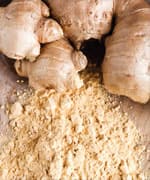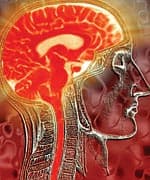|
|
Turmeric compound stimulates brain cell regeneration |
|
|
|
Tuesday, September 30, 2014. An article published online on September 25, 2014 in the journal Stem Cell Research & Therapy reveals an ability for aromatic (ar-) turmerone, a compound found in turmeric, to increase brain stem cell proliferation and differentiation in cell cultures, and to encourage the growth of neuron-generating areas of the brains of animals that received it. The spice turmeric is the source of another compound, curcumin, which has also been found to have neuroprotective properties.
Earlier studies involving aromatic turmerone found that it prevented the activation of microglia cells, which trigger neuroinflammation associated with various disorders. For the current research, Adele Rueger of the Institute of Neuroscience and Medicine in Jülich, Germany and her associates tested ar-turmerone’s effect in neural stem cells, which differentiate into neurons and play a role in brain self-repair. Culturing rat neural stem cells in six different concentrations of ar-turmerone over three days resulted in an increase in stem cell proliferation of up to 80%. Cell differentiation also increased in treated cells.
The team then tested the effects of ar-turmerone in vivo. PET imaging revealed expansion of the subventricular zone and hippocampus, which are areas of the adult mammalian brain in which neurogenesis occurs, in animals injected with the compound.
"While several substances have been described to promote stem cell proliferation in the brain, fewer drugs additionally promote the differentiation of stem cells into neurons, which constitutes a major goal in regenerative medicine," Dr Rueger stated. "Our findings on aromatic turmerone take us one step closer to achieving this goal."
|
|
|
| |
 |
|
What's Hot |
|
|
|
Fish oil use associated with brain volume preservation |
|
|
|
 |
|
| |
A report published on June 20, 2014 in Alzheimer's & Dementia describes a protective effect for fish oil supplementation on the maintenance of brain volume and cognitive function in older men and women.
The study included 193 Alzheimer's disease patients, 397 individuals with mild cognitive impairment (MCI) and 229 cognitively normal individuals who participated in the Alzheimer's Disease Neuroimaging Initiative, a five year study designed to evaluate changes in cognition and brain structure in men and women aged 55 to 90. Subjects underwent neuropsychological testing and magnetic resonance imaging of the brain upon enrollment and at six to twelve month intervals. The analysis included 117 subjects who regularly used fish oil supplements at the initial study visit, among whom a significant percentage reported continued use at subsequent visits.
While average hippocampus and cerebral cortex gray matter volume decreased over time in the group as a whole, the use of fish oil was associated with improvements in these areas. Those who used fish oil over follow-up had better scores of cognitive function at any time over the course of the study; however, the effect mainly occurred among those who were not carriers of the apolipoprotein E4 gene, which has been linked with Alzheimer's disease.
"This retrospective cohort study is the first to examine the potential association of ongoing fish oil supplement use with conservation of brain volume and cognition across the spectrum of normal aging and neurodegeneration," Lori A. Daiello of Brown University and colleagues announce. "The relationships of fish oil supplement use with preserved cerebral cortex gray matter volume in MCI and hippocampus volume in Alzheimer's disease have not been previously reported."
They conclude that their results "highlight the need for future research on the effects of long-term fish oil supplement use on cognitive aging and dementia prevention in middle-aged and older adults."
|
|
|
| |
 |
|
Life Extension Clinical Research Update |
|
|
|
Alzheimer's disease, South Florida location
You or someone you know could qualify for an investigational treatment that may suppress an inflammatory factor thought to be implicated in the neuronal degeneration associated with Alzheimer's disease. Alzheimer's disease is characterized by memory loss, disorientation, and other cognitive deficits.
Help us find a way to fight Alzheimer's.
Study Objective:
Measure the effects of medication injections and nutritional supplements over approximately 29 weeks.
To qualify:
- You must live in the Fort Lauderdale, Miami, or Palm Beach area of Florida.
- Have mild-to-moderate Alzheimer's disease.
Your involvement:
- You will make the required visits to the investigative site.
- Receive blood tests, blood pressure checks, evaluations, study medication and nutritional supplements at no cost
- Upon completion of the study you will be compensated for time and travel up to $500.
Register For This Study
Or call 1-866-517-4536.
|
|
|
 |
|
Highlight |
|
|
|
Life Extension Magazine October 2014 E-Issue Now Online! |
|
|
|
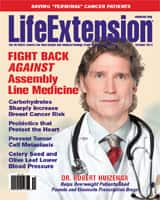
Health Headlines
As we see it: Assembly line medicine, by William Faloon
Deadly carbohydrates: The lethal sugar/cancer connection, by Stephanie Martinson
Unique probiotic targets cardiovascular disease, by Celine Thompson
Natural extracts lower blood pressure, by Brandon DeWitte
Innovative, personalized cancer treatment, by Michael Downey
A lifesaving nutrient in citrus fruit, by Steven DeBerg
Departments
In the News
Wellness Profile: Dr Robert Huizenga, by Astrid Kessler |
|
|
| |
 |
|
Health Concern
Alzheimer's disease |
|
|
 |
|
| |
Curcumin is derived from the Curcuma longa (turmeric) plant. Many studies have suggested that curcumin may be an effective therapy for Alzheimer's because it exerts neuroprotective actions through numerous pathways including inhibition of amyloid beta, clearance of existing amyloid beta, anti-inflammatory effects, antioxidant activity, delayed degradation of neurons, and chelation (binding) of copper and iron, among others (Begum 2008; Mishra 2008; Ringman 2005; Walker 2007).
Curcumin has been found to reduce cognitive dysfunction, neural synaptic damage, amyloid plaque deposition, and oxidative damage. It has also been found to modulate the levels of cytokines in brain neurons (Cole 2004; Mishra 2008). The anti-inflammatory effect of curcumin appears to result from a reduction of nuclear factor-kappaB, a nuclear transcription factor that regulates many genes involved in cytokine production (Aggarwal 2004). Curcumin's ability to chelate toxic metals such as iron and copper and reduce their levels may also help prevent amyloid aggregation (Baum 2004). By inhibiting interaction with heavy metals (e.g., cadmium and lead), curcumin may reduce cerebral deregulation (Mishra 2008). Laboratory studies also suggest that curcumin is more effective at inhibiting accumulation of amyloid beta in animal brains than the over-the-counter NSAIDs ibuprofen and naproxen (Yang 2005). A clinical trial found that doses of regular curcumin ranging from 1 to 4 grams daily were well tolerated and exerted anti-inflammatory effects and possibly reduced amyloid beta aggregation in 27 subjects with probable Alzheimer's (Baum 2008).
|
|
|
| |
 |
|
Latest Products |
|
|
|
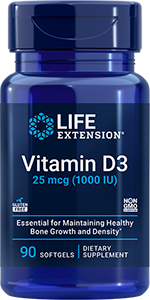 |
Vitamin D3, 1000 IU, 90 softgels

Item #01753
|
|
|
|
Vitamin D3 can be synthesized by humans in the skin upon exposure to ultraviolet-B (UVB) radiation from sunlight. But, due to the winter season, weather conditions, and sun block, the body's ability to produce optimal vitamin D levels may be inhibited. These factors point to the value of taking a daily vitamin D supplement.
Vitamin D has long provided significant support for healthy bone density. However, scientists have also validated the critical role that vitamin D plays in regulating healthy cell division and differentiation, and its profound effects on human immunity. These findings link a deficiency of vitamin D to a host of common age-related problems.
The current RDA is only 600 IU. As a result of startling evidence of a widespread vitamin D deficiency, prominent nutritional scientists are calling on Americans to increase their vitamin D intake to 1,000 IU per day and higher. Currently, most experts in the field believe that intakes of between 1,000 and 10,000 IU for adults will lead to serum 25(OH)D levels above those indicative of vitamin D deficient levels, at approximately 80 nmol/L or 32 ng/mL. |
|
|
|
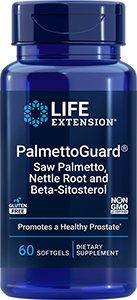 |
PalmettoGuard™ Saw Palmetto/Nettle Root with Beta-Sitosterol, 60 softgels
Item #01790
|
|
|
|
Decades of research substantiate saw palmetto as the gold standard in natural prostate support. Through a novel scientific advance, Life Extension offers a high-potency formula unlike typical saw palmetto extracts.
The saw palmetto berry (Serenoa repens) is rich in bioactive, high-molecular weight compounds including beta-sitosterol. It has been shown to interfere with DHT activity in the prostate, inhibit alpha-adrenergic receptor activity (to support normal urinary flow), and help regulate inflammatory actions in the prostate gland.
This formula contains saw palmetto extract standardized to contain 136 milligrams total fatty acids and 45 milligrams of beta-sitosterol from pine per one softgel. |
|
|
| |
 |
|
Related Life Extension Magazine® Articles |
|
|
|
|
|
|
|
|
|








